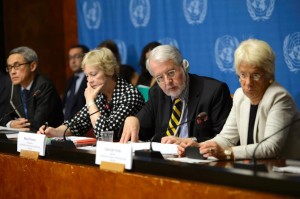As the war in Syria entered its fifth year, the United Nations Independent International Commission of Inquiry on the Syrian Arab Republic on Tuesday called for the establishment of an ad-hoc tribunal to prosecute both sides to ensure accountability for the perpetrators of mass crimes committed in Syria.
Paulo Sergio Pinheiro, Chair of the Commission of Inquiry, addressed the Human Rights Council in Geneva warning that the Syrian civil war had intensified in its destructive scale as combatants used aerial and ground weapons “indiscriminately and disproportionately” and committed an alarming number of human rights violations.
The Commission of Inquiry reiterated the Commission’s dedication to find a path to justice through a Security Council referral to the International Criminal Court (ICC). However, it held that ensuring accountability was a process rather than a single action and that impunity had lasted for too long.
In an interview with the Guardian, Carla Del Ponte, former chief prosecutor of the International Criminal Tribunal for the former Yugoslavia (ICTY) said:
“At the beginning I was for the ICC but now with the changing situation, I think an ad-hoc tribunal could be more efficient and work faster. First of all, the ICC would prosecute only three, four, five perpetrators, not more. I think an ad-hoc tribunal could prepare a list of over a hundred, like the tribunal for the former Yugoslavia … An ad-hoc tribunal could also be based near the region, facilitating access of witnesses, documentation and so on.”
In its concluding remarks, Mr Pinheiro stressed that such ad-hoc tribunals could be based in the region and allow justice to victims at a minimal cost.
Del Ponte said that Russia could be more amenable to a special tribunal on Syria than a ICC referral, as a tribunal would be able to handle more cases. That would mean it would pursue more prosecutions of atrocities carried out by extremist elements of the opposition as well as members of the regime. Russia and China have used their veto in the Security Council to block the adoption of a resolution that would have referred the situation in Syria to the ICC.
The Commission held that, for now, the best means to ensure accountability was to publish names and share these details with national prosecution authorities willing to investigate these crimes on the basis of universal jurisdiction. According to recent news reports, Germany is already investigating members of the Syrian government under President Bashar al-Assad on suspicion of committing crimes against humanity.
Human Rights Watch suggested that the Commission of Inquiry can take additional steps to further the quest for justice of grave abuses being committed in Syria. “In particular, the Commission should – through public letters – put high-ranking individuals on all sides on notice that they could be held criminally responsible for ongoing serious crimes by forces under their command.
The Commission should also set out, based on the evidence it holds, the command structure of the armed forces on all sides. Such a record would be extremely helpful for any future attempts to hold commanders responsible. The Commission should finally seek opportunities to highlight victims’ voices, including through public hearings.”

